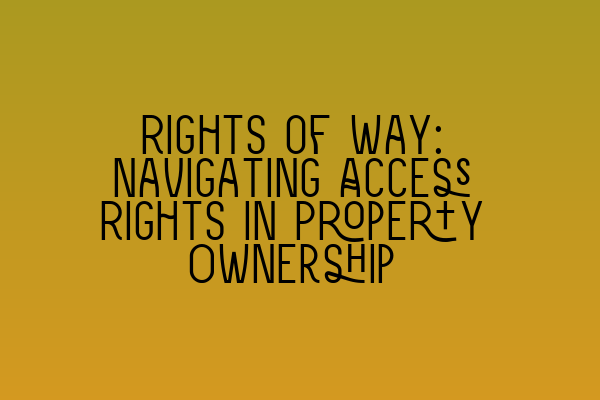Rights of Way: Navigating Access Rights in Property Ownership
When it comes to property ownership, understanding your rights and responsibilities is crucial. One particular aspect that often requires attention is the concept of rights of way. These legal rights grant individuals or groups the ability to pass through a property owned by someone else. Whether you are a property owner or someone seeking access, it is important to navigate the complexities of rights of way to ensure a smooth experience for all parties involved.
At SQE Property Law & Land Law, we specialize in helping clients understand and protect their rights in property matters. In this article, we’ll explore the key points surrounding rights of way, including the various types, their implications, and the steps involved in establishing or disputing them.
Types of Rights of Way
Rights of way can be categorized into two main types: express rights of way and implied rights of way.
Express Rights of Way
An express right of way is a legal agreement explicitly stated in a property deed or document. This agreement grants the specific right of passage through a property to an individual or group. Typically, express rights of way are established during the initial purchase or sale of a property, ensuring that future owners are aware of the granted access.
When examining your property’s deed or title documents, pay close attention to any explicit references to rights of way. If an express right of way is present, it is important to understand its boundaries, limitations, and the obligations it places on both the grantor and the grantee.
If you are considering purchasing a property, conduct a thorough review of the deeds and seek legal advice to ensure the existence and validity of any express rights of way.
Implied Rights of Way
Implied rights of way, as the name suggests, are not explicitly stated in written documents but are instead inferred from the circumstances surrounding the property. These rights of way are typically established based on historical usage or necessity.
A common example of an implied right of way is when a property is landlocked, meaning it has no direct access to a public road. In such cases, the law may recognize an implied right of way to ensure reasonable access to the landlocked property. These implied rights of way are often created through long-standing usage or an implied intention when the land was divided.
Implied rights of way can be complex and require clear evidence to establish. If you believe you have an implied right of way or are disputing the existence of such a right, it is advisable to seek legal advice to navigate the legal complexities involved.
Establishing and Disputing Rights of Way
Establishing or disputing rights of way can be a complex and contentious process. Multiple factors need to be considered to determine the validity of a right of way claim, including the language in the property deed, historical usage, neighboring properties, and local regulations.
If you are seeking to establish a right of way, the first step is to gather evidence supporting your claim. This may include reviewing historical documents, consulting with neighbors or local authorities, and seeking legal advice to ensure you have a strong case.
If you are a property owner facing a dispute over a claimed right of way, it is essential to carefully examine the evidence presented. Engaging the services of a solicitor experienced in property law is highly recommended to protect your rights and interests.
Professional legal advice can help you navigate the complexities of establishing or disputing rights of way. At SQE Property Law & Land Law, our team of expert solicitors has extensive experience in property matters and will guide you through the process, ensuring your rights are protected.
The Importance of Expert Legal Assistance
At SQE Property Law & Land Law, we understand the significance of rights of way in property ownership and the potential impact they can have on both individuals and businesses. Our team of highly experienced solicitors aims to provide professional legal assistance tailored to your specific needs.
If you need assistance with understanding, establishing, or disputing rights of way, we are here to help. Contact us today to schedule a consultation and gain the expert guidance you need.
Related Articles:
